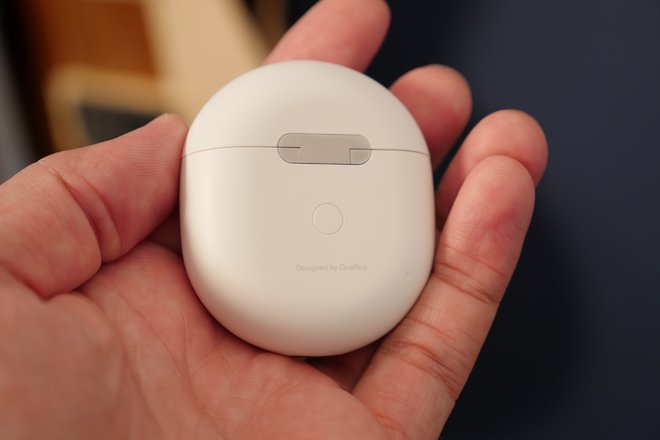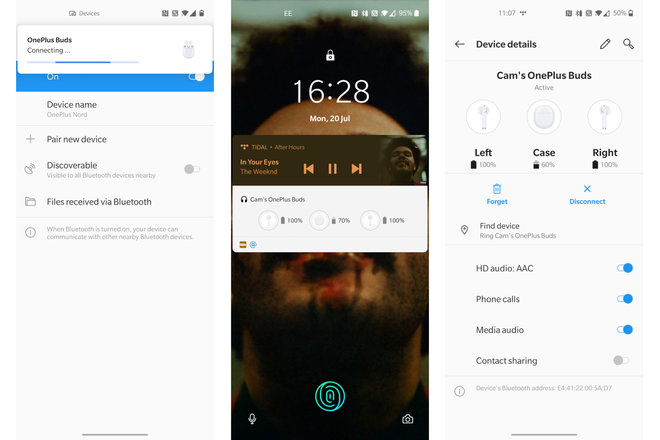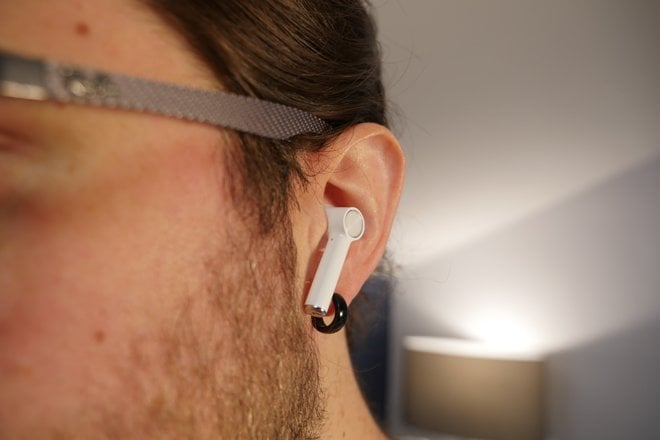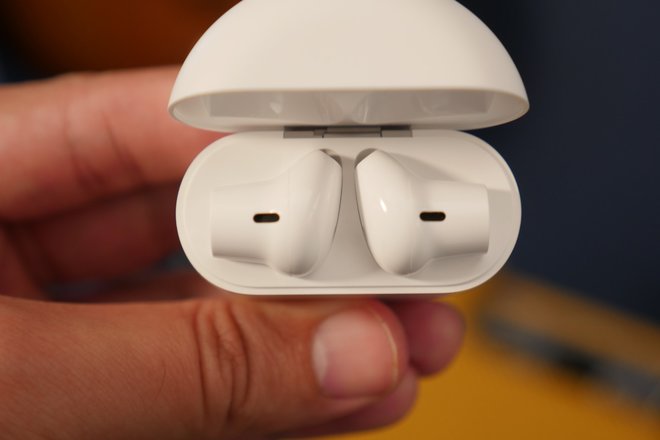
While OnePlus hasn’t been a big player in the world of earphones, it’s long offered in-ears for its customers to add convenience and value-for-money personal audio for its smartphone users. It was initially the wired Bullets earphones, before the wireless neckband version arrived.
Now, the company has joined the true wireless trend by offering the OnePlus Buds, its Apple AirPods rivals. The price point is attractive and the promise of convenience and long battery life could be appealing for those not looking to spend big. But does it all add up?
You’ve seen this before
OnePlus’ approach to earbuds design isn’t exactly groundbreaking. If you saw these ‘buds lying on the side at a distance, you’d almost certainly mistake them for AirPods. At least, you would if they were the white model that we’re reviewing. Thankfully, there is also a black pair and a bright blue pair too.
The build is almost entirely plastic, and features that moulded teardrop shape that tapers into your ears, with a pill-shaped opening at the end to channel the audio. Unlike AirPods, the exterior of the Buds features an almost cylindrical protrusion, which then has the round touchpanel on the outside, used for basic controls.

You can tap this panel to accept calls or double-tap to skip to the next track in your playlist queue. In our testing a single tap while playing music didn’t do anything; likewise, a triple-tap resulted in no response – so it really is just a very basic implementation at present. Since there are no other buttons, there’s also no physical volume control. That means you’re reliant on your smartphone to play, pause, skip back and control the volume.
It is worth noting that a software update is coming to enable the ability to programme what that double-tap action on the touchpad will do – but until that arrives, this is the experience you get with the Buds.
When worn, the OnePlus Buds feel lightweight and unobtrusive thanks to a design that points the exterior shaft downwards, outside the ear. That’s a good thing in a lot of ways. You can wear these in-ears for a good chunk of time without feeling any discomfort or getting that invasive pressured feel that often occurs when you use more tightly fitting ear tips.
It does mean you don’t get a consistent and long-lasting seal though. With this style of earbuds there’s not supposed to be that tight seal, the ‘buds should just rest in your ears. But that also means there’s that slight feeling that these might fall out – and so the temptation is to push them in further (which does ruin the sound). It also means that noise-cancelling or isolation is virtually non-existent.
Regardless of the way the Buds feel when worn, we didn’t have any issues with either one falling out.

When you want to stow the Buds away for later use, simply feed the earbuds’ stems into their included charging case. The metal contact points at the bottom line-up with the contact points inside the case and the ‘buds snap-in magnetically.
Convenience and reliability
Using the OnePlus Buds with a OnePlus phone is where this pair of earbuds comes into its own. There are features that make for greater convenience – similar to what you get when you use a pair of AirPods with an iPhone.
When you first flip open the case’s lid to pair the Buds you get a pop-up window – complete with graphics – on the phone’s screen for quick pairing. Once connected, there’s a notification that appears in the drop-down drawer and on the lock screen that shows you the current battery life of the case and the earbuds. You can also view these levels by just accessing the Bluetooth settings menu and tapping on the settings cog icon next to the Buds name.

It’s a really useful feature to have. Particularly the case’s battery level, because quite frequently you’ll find that’s the battery that needs topping up, especially since it’s designed to always keep your earbuds at 100 per cent charge. It’s not a feature that all earphones offer, particularly not at a system level like this. Most require you to download an additional app for such insight.
There is a slight downside to this though: not having an app means only OnePlus users really get the benefit of this convenience. And it’s this convenience that makes these earbuds attractive. The other downside is we’re not sure how accurate the individual earbuds’ charge level indicator is. It constantly showed 100 per cent battery for those, even after an hour of listening to music, while the battery level in the case dropped more realistically over time.
OnePlus made big claims about the Buds’ battery being a big pain point among buyers of true wireless earbuds, but the truth is there are longer-lasting ones out there. Still, with seven hours of music playback available out of the case, the OnePlus Buds are certainly more than good enough, especially when combined with the additional 23 hours that can be delivered from the case.

Each of the earbuds works independently, so your left earbud will work without the right earbud, and when you want to switch between OnePlus Buds audio and phone audio during a call, it’s simple to do so by tapping an icon on the screen. What’s more, when you remove one of the buds from your ears, it automatically pauses the music. We tested this feature quite a lot, and it consistently worked well.
Great for music, not for calls
The good news is that the Buds can produce great sound.
Short version: if you like bass, you’ll love the OnePlus Buds – just don’t try and jam these ‘buds into your ear canal. Just rest the ‘buds in your ears like you’re supposed to and things sound just fine.
While the bass is definitely prominent, the sound feels quite well balanced – and there’s enough detail that you get a good sense of everything going on.

Those subtler mid-tones aren’t lifted quite as much as we’d like – to reveal parts of the backdrop we’d normally miss – but it doesn’t necessarily feel lacking either.
When higher frequency elements get loud there’s a tiny bit of distortion, but it’s not the most noticeable. It’s most noticeable when vocalists put emphasis on letters like ‘S’ and ‘T’ – pronouncing what’s known as sibilance.
With a snug fit, the bass gets a little too much when you have heavy thumping bass drums and toms. This can become a bit overpowering. Again: if you buy the Buds, don’t push them too far into your ears.
Listening to Crush by Tessa Violet – which features an electronic bass drum and vocals at the beginning – and we felt the bass drum pedal pounding on the drum skin, while the vocals remained clear.
Listening to Khalid’s Free Spirit and we got a really good sense of the breadth of sound available. That low droning bass is at the forefront, but there’s also some nice palm-muted guitar strumming in the left channel that comes through clearly.
Or listening to Samestate’s cover of I Melt With You, the clarity of the piano still cuts through the rest of the sound, despite that loud pounding bass from the drums and bass guitar.

We’re actually impressed by just how much bass is possible from these unassuming in-ears. Compared to so many others in this price range – and even some more expensive buds – that dynamic, impactful and sound is full of life and excitement. Those who like quite a natural, flatter sound won’t enjoy the Buds though.
Sadly, when making phone calls we had a hard time hearing the caller clearly. We struggled to hear words, and often resorted to just switching to our phone’s audio, so we wouldn’t recommend the Buds for those who primarily want to jump into lots of hands-free calls.
